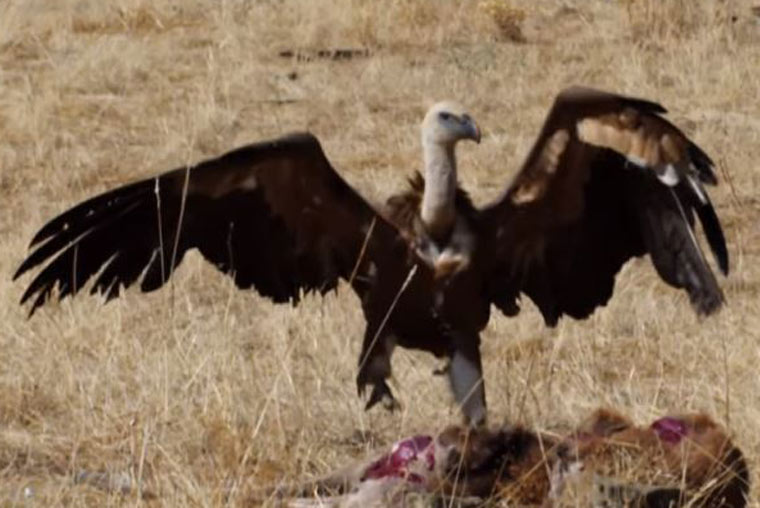-
info@aaanimalcontrol.com
Call us for help in your town
Humane Wildlife Education
How to Keep Away Vultures
Need bird removal in your hometown? We service over 500 USA locations! Click here to hire us in your town and check prices- updated for year 2020.
Vultures are generally not considered to be a dangerous creature when they land in your yard, because as soon as you get anywhere close to it, it simply flies away. That's not to say this isn't an intimidating bird, however, and it's a certainly not a bird that many homeowners would want to get too close to. They're well known for scavengers, destroying the remains of other animals left behind by other predatory attacks. In movies such as Disney's “Snow White and the Seven Dwarves," vultures are portrayed as frightening creatures, and they've developed an unnecessarily bad reputation.

One of the biggest problems that vultures pose to homeowners is that of droppings. They're not very nice to look at, and are usually rife with disease threats too. In fact, birds (as well as rodents) are one of the most common ways of spreading disease, and across great distances, this can even be a combination of the two — a bird catching a rodent and then flying with it, perhaps dropping the dead carcass some distance away.
Of course, as well as not buying into the bad rap that vultures have, you should be aware that these great birds are covered by something called the Migratory Bird Treaty Act of 1918, and this means you can't harm the creature in any way. You can't harm nests with eggs in, and you most definitely can't attempt to trap the bird. Plus, then you'd have the dilemma of what to do with it then. There are rules and regulations that you must follow when it comes to wild animals, and the vulture is no exception to these rules and regulations.
How to Keep Away Vultures
There are plenty of methods that you can use to try and deter these large birds — buzzards and vultures — from your garden or land. Loud noises is a great place to start, and you could try clapping your hands together loudly and repeatedly when you see them. There are certain times of the day that these birds will tend to come back the most, and you'll usually find that it is within a couple of hours before dusk. Keep a watch to see what time your birds are coming back, and then use that information to place noisy items in the yard, such as a radio, to deter them. We do recommend explaining what's going on to your neighbor's before doing something like that. You don't want to scare them as well as the vultures, do you?
If you know where the vultures are landing — where the roosts and perches are — you can place sprinkler systems so that they are facing that exact direction, and then timed to go off and shoot jets of water when the vultures try to make themselves comfortable. Nobody likes being squirted by cool water, especially when they aren't expecting it, and it's actually not a bad trick to use when you're dealing with any wild animal. You can have the sprinklers timed to go off when the animals come around. Although, we must warn you, we watched a video just this morning of a raccoon playing with a sprinkler system, which obviously doesn't quite do the job you had intended it to do.
Scarecrows have come quite the distance since their homemade, man-on-stick formations, and you can get electrically run scarecrows now that make noise, move, and even squirt water. Scarecrows are well known, even now, to scare away birds and other wild animals, and when you combine the newer technologies — noise, water and movement, for example — you have a much better chance that they will work well for you.
Of course, there are a few other tricks that you can try. If you have loads of old CDs, games or DVDs that you're planning on throwing away, use them as vulture and bird deterrents! Birds are not particularly fond of light beams and bright lights, and when the sunlight hits those mirrored CDs, bright light beams will be radiated across your land. It'll be a beautiful sight for you, although you should make sure you don't accidentally blind yourself by looking directly at the bright beams of light. The birds won't like it much, on the other hand, and some homeowners have had great success using this as a vulture prevention method.
If all else fails, give the professionals a call. As we've already states, these buzzards and vultures can grow to quite some size, and they're certainly not pleasant in the back yard. Get some advice, do the job properly, and make sure you're keeping all problematic/pest birds away from your land with methods that actually work.
For more information, you may want to click on one of these guides that I wrote:
How much does bird removal cost? - get the lowdown on prices.
How to get rid of birds - my main bird removal info guide.
Example bird removal photographs - get do-it-yourself ideas.
Bird job blog - learn from great examples of bird jobs I've done.


















